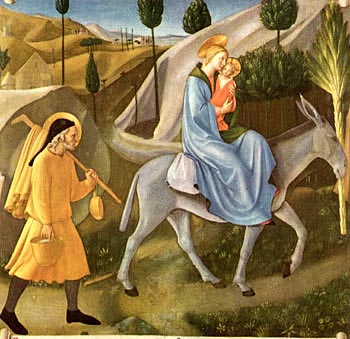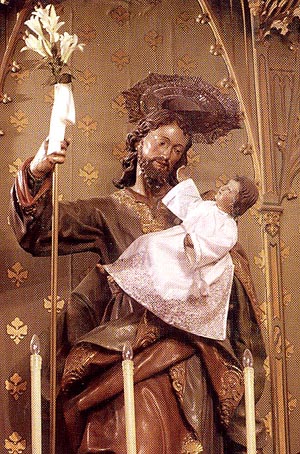St. Joseph, March 19
There is not very much biographical data about St. Joseph. We know that he was from the royal dynasty of David. He was a virgin, he was married to Our Lady, they remained virgins after marriage. He was present at the Manger at Christmas. He journeyed with the Divine Infant and Our Lady to Egypt and returned. After that, there is silence about him.
St. Joseph was the greatest saint, or one of the greatest saints of the Church, since some sustain that either St. John the Baptist or St. John the Evangelist would be the greatest saint. In any circumstance, there are very good reasons to suppose that he, St. Joseph, was the greatest saint. One would expect to find an abundance of edifying biographical material about so great a saint. But the opposite is true: both Scriptures and Tradition say very few things about him. How can this be explained? First, we can observe that Scriptures only speak a few times about Our Lady, who is much more than St. Joseph. She is the masterpiece of creation, incomparable to all others. Again, why do Scriptures say just a few words about these two great figures? The traditional reason given is that both were very humble and chose to be out of the limelight in order to let Our Lord shine and receive all the honor and glory. This is a very good reason, but there is something else. It is something that reflects the spirit of the Catholic Church very much. Any magnificent actions in their lives were overshadowed by the fact that Our Lady was the mother of the Creator and St. Joseph was the foster father of Our Lord Jesus Christ and spouse of Our Lady. Anything else they did was effaced in light of this. For example, consider these two extraordinary facts: the perplexity of St. Joseph in face of the pregnancy of Our Lady, and her action at the wedding of Canaan, where she requested and obtained a miracle from Our Lord. St. Joseph took a very noble position. Our Lady did something remarkable. But these facts dull in face of the grandeur they had as mother and father of God.
But what does it mean be proportional to Our Lady? Only this title – spouse of Our Lady – is something far beyond and higher than anything St. Joseph did or could have done. Along this vein, another question arises: What can be more admirable than having been chosen to be the foster father of God? Nothing can be comparable to that. There is something even more beautiful here. Divine Providence permitted the cult of St. Joseph, as well as of Our Lady to develop. These cults were not based on a plethora of information. Instead, they were based on the theological reasoning that St. Joseph and Our Lady were the father and mother of God. Therefore, they should be the greatest saints. With this, God left man to imagine the moral profiles of these two saints, based on the sources of Revelation. Because Catholics do not practice free interpretation of the Scriptures, they follow the guidance of both the Magisterium of the Church and sound theologians. When God hid the detailed account of St. Joseph and Our Lady's lives, He encouraged and inspired the Church to contemplate their many facets and learn from the Hierarchy. That is to say, He wants the saints and the doctors to elaborate the doctrine from the abridged data He gave us. He wants man to distill from Scripture and Tradition the good doctrine He hid there, as the bee draws nectar from the flower. When someone sees a flower, he doesn’t imagine that something so sweet would be inside. The same is true regarding many truths of Revelation, especially with regard to St. Joseph and Our Lady. So, from the silence of Scriptures regarding St. Joseph and Our Lady, you can deduce the approval of God for the hierarchical character of the Catholic Church. It seems to me a remarkable way to better understand one beautiful facet of the Catholic spirit. Source: https://traditioninaction.org/SOD/j065sdStJoseph3-19.htm |




